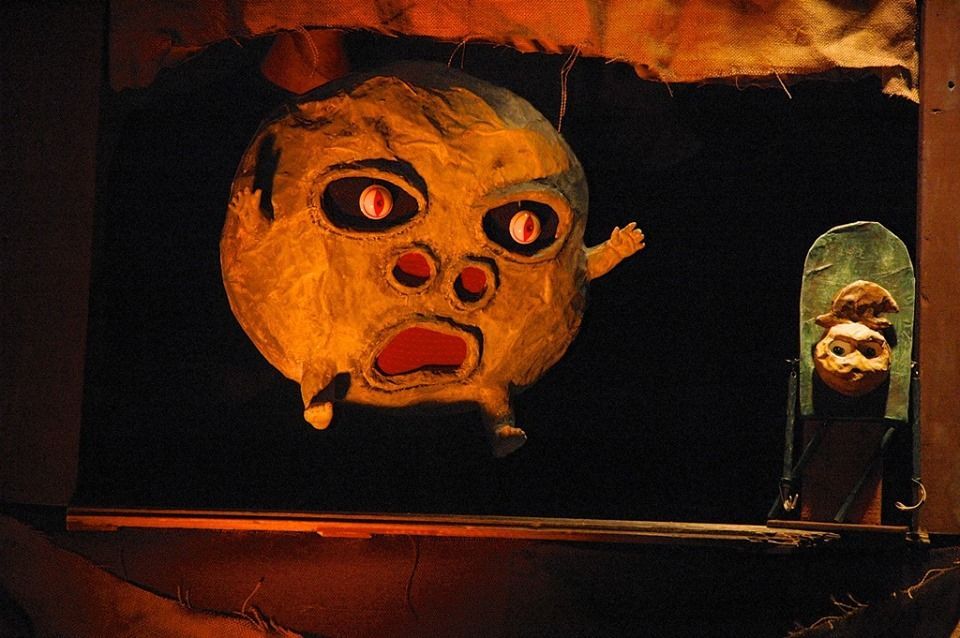Sh*tfarmer, a puppet show for adults, played to a packed house at the Bebe Theater on Friday, Dec. 6. The show followed an everyman struggling to collect and haul poop to fertilize what turned out to be a magical plant.
Together, Asheville-based dynamic duo Keith Shubert and Madison J. Cripps seem to be harboring an inside joke impossible to explain to mere mortals. Describing how their working relationship began, Cripps says, “He wore me down until I acquiesced.” Generally, Cripps built the set and Shubert built the puppets, and both performed the show. They crafted a complex and deeply personal puppet production out of the vexations of daily life. “The show deals with a lot of my own frustrations with toil, work and monotony,” Shubert says. “But also with personal things like my relationship with Madison and how powerful and magical it is to work together.”
Sh*tfarmer reflected on the drudgery of a pointless job, the insensitivity of authority figures and being overwhelmed by media messages with a capricious flair, inviting audiences to laugh in the face of the mundane.
Although the show dealt with struggle, it was not a struggle to watch. The conflict between the innocuous little farmer and the demanding authority figures was like a modern-day Cinderella story. There was something so touchingly sad and yet comical as the sh*tfarmer, with his Howdy Doodie-like face and tombstone-shaped body, diligently shined his faucet with a tissue. The guy had pride. Despite the dreariness of his situation he still had a work ethic. How could we not care about him? We wanted him to get out of this mess and we were rooting for him. Plus, the production’s set exuded its own persona with whimsical pipes, working doors, growing trees and even a tiny commode.
Shitfarmer Trailer from There's a Thing in There on Vimeo.
Shubert, who wrote the performance in 2012, calls it “a pre-apocalypse show.” A puppeteer for 15 years, he has always wanted to do a non-verbal feature play. “The challenge is how to sustain an audience for 45 minutes without saying anything,” he says. “And to say something without saying anything.” The benefit to a non-verbal production is that there are no language barriers and therefore it easily translates to international audiences.
Even though the show was completely without words or music, sound was cleverly employed: garbled noises represented voices of the authority figures arguing, sound effects highlighted bodily functions and working mechanisms, bells and chimes were used as props and to designate scene endings. Most notably, there was an ingenious use of radio static to represent the incessant drone of a modern day society inundated by media.
Many forms of puppetry — hand puppets, tabletop puppets, rod puppets and masks — were interwoven into the show. The sense was that we were in the hands of an expert storyteller with an agenda, which created its own suspense. The monotony of the sh*tfarmer’s work was balanced by hints of hope, such as the slowly-sprouting tree that we suspected could be his ticket out, and the appearance of a jester-trickster character. The magical spectacle of the ending did not disappoint.
With plenty of room for interpretation, identification and projection, Sh*tfarmer offered the modern day existentialist a ray of optimism in an otherwise banal existence.




Before you comment
The comments section is here to provide a platform for civil dialogue on the issues we face together as a local community. Xpress is committed to offering this platform for all voices, but when the tone of the discussion gets nasty or strays off topic, we believe many people choose not to participate. Xpress editors are determined to moderate comments to ensure a constructive interchange is maintained. All comments judged not to be in keeping with the spirit of civil discourse will be removed and repeat violators will be banned. See here for our terms of service. Thank you for being part of this effort to promote respectful discussion.